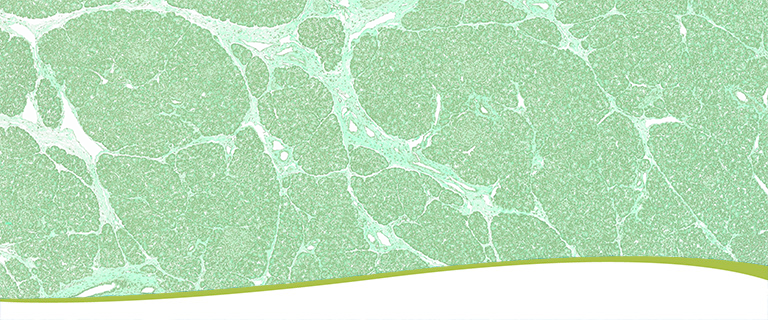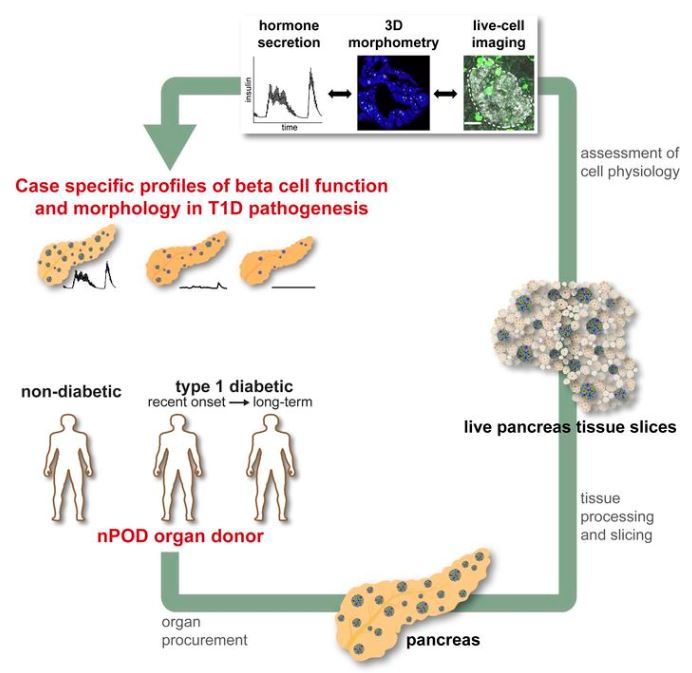nPOD Slice Manuscript Publication

Pancreas tissue slices from organ donors enable in situ analysis of type 1 diabetes pathogenesis.
Panzer JK, Hiller H, Cohrs CM, Almaça J, Enos SJ, Beery M, Cechin S, Drotar DM, Weitz JR, Santini J, Huber MK, Muhammad Fahd Qadir M, Pastori RL, Domínguez-Bendala J, Phelps EA, Atkinson MA, Pugliese A, Caicedo A, Kusmartseva I, Speier S.
nPOD would like to highlight this recent publication resulting from the collaborative work of a group of nPOD investigators based at institutes from the Universities of Dresden, Miami, and of Florida, including the nPOD Core laboratory. This paper describes the establishment of a new study platform to investigate type 1 diabetes in live pancreas slices. With this approach, it is possible to examine the function and abnormalities of pancreatic cell types, including islet cells, without having to remove them from their natural environment. In this setting, it is possible to examine also cellular interactions that involve the immune cells that cause type 1 diabetes, and many other applications are possible.
The paper describes initial results from studies in nPOD donors with and without type 1 diabetes. This study was led by Dr. Speier, who had pioneered the study of pancreas slices in animal models. In collaboration with the nPOD co-directors Dr. Pugliese and Atkinson, nPOD’s Dr. Kusmarsteva, and the other co-authors, Dr. Speier was able to pilot the generation of viable pancreas slices from human organ donors. As a result of this work, nPOD is now prepared to distribute pancreas tissue slices for additional studies conducted in other institutions within the US and Canada, and 12 new research projects that will study pancreas slices have already been reviewed and approved. This seminal study was supported by funding from the Hemsley Charitable Trust George Eisenbarth nPOD Award for Team Science.
Publication Abstract
In type 1 diabetes (T1D), autoimmune destruction of pancreatic β cells leads to insulin deficiency and loss of glycemic control. However, knowledge about human pancreas pathophysiology in T1D remains incomplete. To address this limitation, we established a pancreas tissue slice platform of donor organs with and without diabetes, facilitating the first live-cell studies of the human pancreas in T1D pathogenesis to our knowledge. We show that pancreas tissue slices from organ donors allow a thorough assessment of processes critical for disease development, including insulin secretion, β cell physiology, endocrine cell morphology, and immune infiltration within the same donor organ. Using this approach, we compared detailed pathophysiological profiles for 4 pancreata from donors with T1D with 19 nondiabetic control donors. We demonstrate that β cell loss, β cell dysfunction, alterations of β cell physiology, and islet infiltration contributed differently to individual cases of T1D, allowing insight into pathophysiology and heterogeneity of T1D pathogenesis. Thus, our study demonstrates that organ donor pancreas tissue slices represent a promising and potentially novel approach in the search for successful prevention and reversal strategies of T1D.

